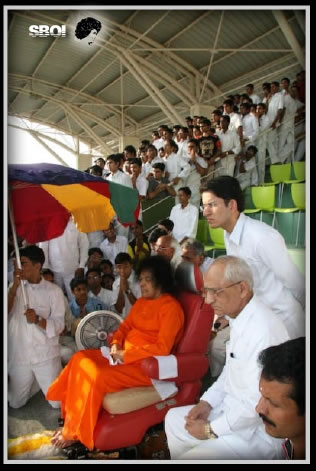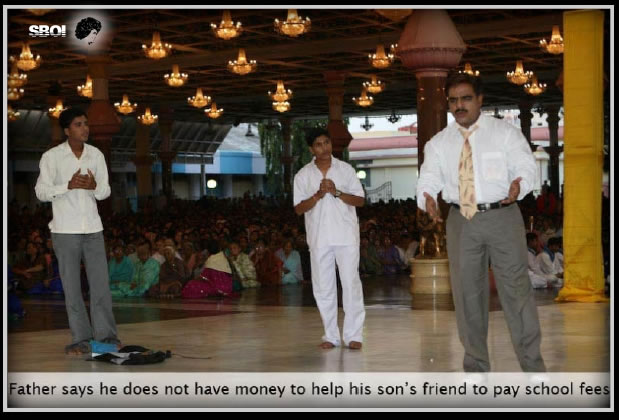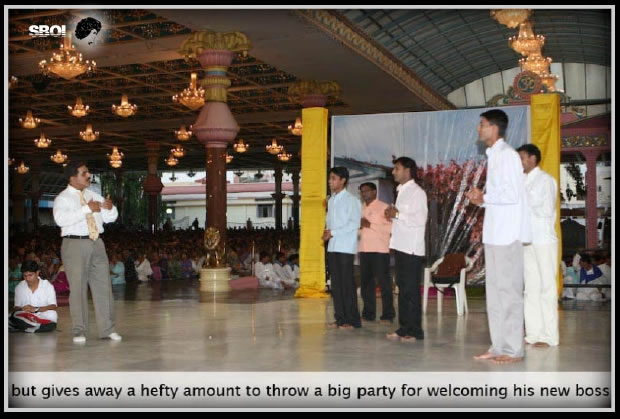|
Swami visits Indoor stadium and MP programme 17th Dec 2008
|
|
|
|
Swami has always stressed on the power of the youth and the wisdom and experience of the adults. His idea is the harmonious mingling of the two to usher in the "Golden Age" of wisdom and energy. |
|
|
|
|
|
|
|
He has constantly wanted the students-staff and
the elders in the Ashram to work together more and more each day for the benefit of
everyone and that seems to be the way He plans to take His mission to next gear.
|
|
|
|
Responding positively to His wishes (and thats how the response is always anyways!), all the ex-students currently working in His Trust under His care assembled in the bhajan hall to seek His blessings. |
|
|
|
|
|
|
|
In the meanwhile, the youth from Madhya Pradesh and Chhattisgarh were ready with a music cum drama cum dance programme to be presented before Swami. The stage and backdrops were set. At the same time, the students from the University waited in all readiness in their sports gear for His promised visit to the stadium to watch their matches. |
|
|
|
|
|
|
|
Thus it would have been that any person with the knowledge of these three would have wondered what on earth was Swami going to do. The beauty of the whole thing however was that not a soul knew all the three different venues and planned activities in total. Anyone's knowledge was at best partial and it is only looking back at the unfolding of events now that we speak as though we were knowing all these in advance! So lets now actually go through the blossoming of the various programmes in the order in which they occurred. |
|
|
|
|
|
|
|
|
|
|
|
|
|
|
|
|
|
|
|
|
|
|
|
|
|
|
|
|
|
|
|
|
|
|
|
|
|
|
|
|
|
|
|
|
|
|
|
|
|
|
|
|
|
|
|
|
|
|
|
|
|
|
 |
|||
 |
|||
 |
|||
 |
|||
 |
|||
 |
|||
 |
|||
 |
|||
| Via the lift, Swami
moved up to the upper galleries and then the players took their positions. As soon
as Swami came to the balcony, everyone cheered and Swami raised both His hands as if
He was blushing at the rapturous welcome! The game began. As always, Swami was
watching intensely though the sun was beating down upon Him. Soon a huge
multicoloured umbrella was placed and seeing the boy holding it, Swami smiled. The
game was slow and mistake filled compared to what we watch on TV and soon Swami
said, "They should not hit the ball straight. Hit it cross and out of reach." The
physical trainer propped up, "Swami they are not yet used to the new court. They
will soon improve." Swami immediately said, "See, the game of tennis has nothing to
do with old courts and new courts. They have to learn to play better." Everyone
around laughed and Swami too joined in the laughter. Sitting there, Swami's eyes
also fell upon some buildings in the distance and He asked, "Whose are those
buildings?" No one knew exactly and the question just passed. After about 5-7
minutes of watching the game, Swami decided to leave. Trays of chocolates were
brought up to Him and He threw chocolates to the eager beavers waiting down! That
being done, Swami moved back to the lift and descended. He then vended His way to the indoor stadium proper where the basketball and volleyball teams had gathered. Alighting from the car, Swami sat amidst a joyous sea of students and told the players to begin. A thunderous chanting of the Sai Gayathri began and the entire stadium joined in and my God! What a feeling it was! So many international games have taken place here and not once was the feeling this way. Every time, loud and fast paced music dominated the proceedings to give the "sporty flavour". But today there seemed to be a divine wafting feeling. Swami seemed thrilled and naturally so too was anyone in the stadium. These chants have that power and austerity which make them apt on any occasion for which occasion is not enhanced by the thrilling of the heart? So, after the prayer, the game began. The 5-6 minutes that Swami witnessed saw an intense battle between the two sides. Seven baskets were scored in all - 4/3 being the score. While watching, Swami said, "When they play, all should not keep running from this side to that. They should spread out and pass." The students made frequent changes in the team composition so that every player gets a few minutes of play in the Divine presence. That ploy drove home a very important lesson. None of the boys were focused on the actual game. Everyone was trying to ensure that everyone else gets a chance to play in His presence. When the focus is on ensuring that all are happy- Samastha Loka Sukhino Bhavanthu - the "game" automatically gets exciting and fantastic. Seven baskets in 5 minutes was really something and that also included two 3 pointers! Now His attention turned to the volleyball court. It was getting a bit late considering the fact that two more programmes awaited Him. Swami sat and saw a few serves and volleys and then blessing the boys, started moving towards the mandir. It is fascinating scene to see the devotees throng around His car. It is also an event of great profundity. What do we mean by that? Simply that since this is an opportunity to see Swami from close and study His reactions and expressions, many an important decision gets made. "Swami if you smile at me, I shall proceed along with the court case," thinks one while another may think, "When I throw this rose on to Your car's bonnet, if it stays there, I shall not leave my hometown and reside there itself." Amazing how many such vital decisions get made "on the road"! Needless to say, on the long run everyone has made the right decision! Another amazing thing about these trips is the number of people. If the Kulwant hall is packed with devotees waiting for Him, how is it that so many are on the road too? Wherever the Lord is, the devotees have to be! |
|||
 |
|||
|
|
|
|
|
|
|
|
|
|
|
|
|
Swami reached the
Kulwant hall and drove straight towards the bhajan hall. He entered the bhajan hall
and said to all the "staff-students" assembled there, "Actually I did not plan to
come here." For an optimist, this is a reason to cheer that in spite of everything,
Swami had come while for the pessimist it would be that Swami was not actually
interested! Just like everything the Lord does, it is always right and whatever is
ones attitude towards it, it turns out to be exactly that. The staff gave Him a
letter that conveyed all their feelings and thoughts. Swami accepted it, opened it
and read it for a while. Making a few remarks about the games He had witnessed,
Swami moved towards the centre stage. Blessing the Veda chanting to a stop, He
quickly asked the programme to begin. |
|
|
|
|
|
|
|
|
|
|
|
|
|
|
|
|
|
|
|
|
|
|
|
|
|
|
|
|
|
|
|
The scene opens, revealing a lady reading out the Bhagavatha (an epic that narrates the story of Lord Vishnu and His devotees) to a number of other women, and explaining the meaning of the slokas (hymns). She says that it is the duty of the housewife to give charity to the deserving, the unfortunate ones who cannot earn by the sweat of their brow, and not to pretenders who lead idle, parasitic lives. The women disperse sometime later, and the lady is left alone with her little son, who has all along been an interested listener. Presently, a blind beggar comes and makes much fuss to attract attention but he is rebuked and sent away. Then, there comes along a hefty mendicant with a pompous paunch and a polished copper vessel filled with grain and a richly caparisoned Tambura (a stringed musical instrument), and the mother respectfully welcomes him and offers him rice and coins, and falls at his feet, asking for his blessings. The son is nonplussed; he asks the mother why she had not followed what she had herself preached a few minutes ago and he is dismissed with the curt answer, "Cheppinattu Chesthara? Can we act as we say?" The mother is irritated by the impertinence of the son who dared question the behaviour of grown-ups. She drags the boy to the office room where the father, an Upper Division Clerk in some Office, is busy with the files. |
|
|
|
|
|
|
|
|
|
|
|
|
|
|
|
|
|
|
|
|
|
|
|
|
|
|
|
|
|
|
|
|
|
|
|
|
|
|
|
He gives the son a
long lecture on the value of education and how people should study and get educated
whatever may the difficulties. Suddenly, a schoolboy pops in and asks for some money
to pay his fees, for otherwise his name will be struck off the rolls. The father
says that he has no money with him and shows the boy his empty wallet as proof. A
few minutes later, a batch of young men, all clerks belonging to his office, thrust
themselves in and hold out a subscription appeal calling for contributions for a
'Welcome Dinner' in honour of an officer, taking charge of their office in a few
days! The father is very jubilant at the idea, says that it must be done very
grandly so that the new man may be pleased and also offers to make a speech. He then
pulls out the drawer of the table and gives them a substantial amount. |
|
|
|
|
|
|
|
|
|
|
|
|
|
|
|
|
|
|
 |
|||
 |
|||
 |
|||
 |
|||
 |
|||
| The scene now shifts
to Krishna's home. Next day at school-time, the boy refuses to go. He throws away
his books saying that going to school is a waste of time. The distracted parents
send for the teacher, who comes rushing in. Then, Krishna says, "If all that you
teach, as mother, father and Guru is only to be spoken and written, if all that is
learnt is to be discarded when it comes to action, I do not understand why I should
learn anything at all." This opens the eyes of all three and they praise the boy as
their "Guru," and decide thereafter to speak the Truth and live by the Truth. Swami was very involved in the drama. Though the sets and backgrounds were simple and neat, the play was presented very powerfully. It concluded with a very soulful song which had as a part of it the Telugu portion the famous song, "Humko Tumse Pyaar Kitna". A few eyes moistened at the emotion and Swami seemed so very pleased. As the final formation came into position, the next programme began. There were three songs sung by Sri Abhas Joshi, a former Balvikas student and a top three finalist of a singing competition on national television. The songs were all wonderful. The first one was,"Baba, Mein Aaya Dwar Tumhare". There was such a lovely melody coupled with sheer power in his voice. The second song was a poetry stating, "After seeing the joy of chanting His name with Love in Fakiri, I see no joy in riches!" The third song was the popular, "Satyam Shivam Sundaram". As He completed, Swami blessed prasadam to be distributed. He was all smiles as He raised both His hands in joyous benediction and then promised, "I will give you photos tomorrow!" Bestowing a final blessing as He went into the car too, Swami retired for the day. |
|||
 |
|||
 |
|||
 |
|||
 |
|||
 |
|||

 12 photos: Swami with - Madhya Pradesh
and Chhattisgarh devotees
12 photos: Swami with - Madhya Pradesh
and Chhattisgarh devotees
























